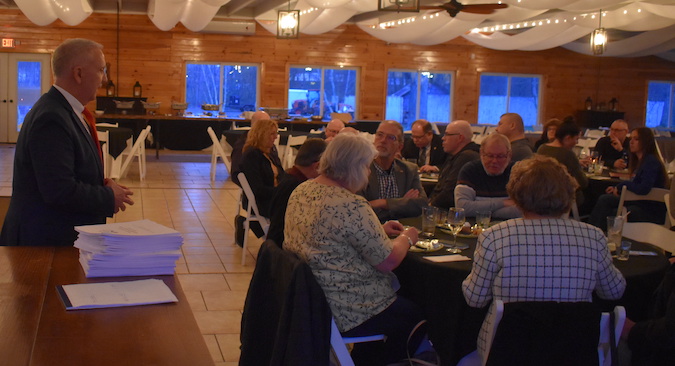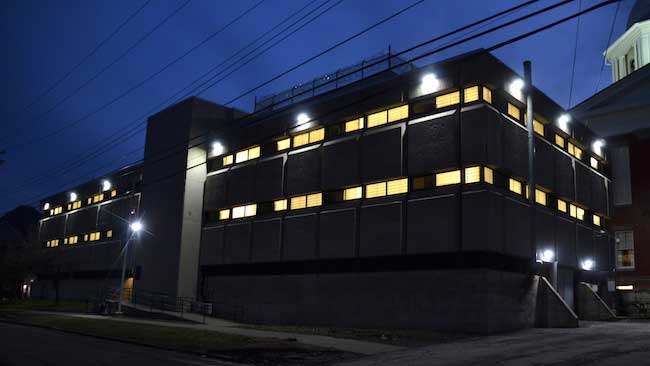District Court expected to go to public referendum in November
Legislature chairwoman says new court would offer better service at lower local expense

Photos by Tom Rivers: Orleans County District Attorney Joe Cardone meets with officials from the Orleans County Association of Municipalities last week and discusses a possible district court in the county.
ALBION – Orleans County voters will likely be asked this November in a public referendum whether the county should create a district court that would be staffed full-time and could include multiple towns in the county.
Orleans County officials want to put the issue to a public vote. There will be public hearings about the district court at 7 p.m. on May 7 and June 4 at the Orleans County legislative chambers at the County Office Building on Route 31.
The issue almost went to a vote last year, but was withdrawn as a referendum to allow more time to complete a study on the financial implications, and other pros and cons of the court.
County Legislature Chairwoman Lynne Johnson was part of a committee that has been studying the district court. She believes the committee’s report “leaves no doubt this is the best path forward.”
She said the district court would represent collaboration and cooperation among local governments, while bringing down court costs and increasing services.
“Are significant cost savings, better use of resources, streamlined court management and making better use of law enforcement personnel’s time enough to overcome the inertia of ‘things are fine the way they are?’” Johnson said during her state of the county address last week. “We are certainly going to find out.”
She wants residents and local officials to “start the conversation” about the issue.
The Orleans County Magistrates Association has been steadfastly opposed to a district court. The town justices and court clerks at the town level have all signed a resolution last October saying they are opposed to a district court in Orleans County.
“The Magistrate Association of Orleans County is opposed to any efforts to eliminate the local and convenient access to justice by our citizens and find that the Town Courts of Orleans County provide a meaningful and necessary presence within our community for judicial resolution of conflicts, continued public safety of our citizens, and the protection of constitutional guarantees for all of our citizens,” according to the resolution signed by the justices and court clerks.
The resolution was dated Oct. 14 and signed by Albion town justices Gary Moore and Joe Fuller, Barre Town Justice Frederick Root, Carlton Town Justice Kevin Hurley, Clarendon Town Justice Thomas DiFante, Gaines Town Justice Charles Prentice, Kendall Town Justice Debra Kluth, Murray town justices Ted Spada and Gary Passarell, Ridgeway Town Justice Joseph Kujawa, Shelby Town Justice Edward Grabowski and Yates Town Justice Donald Grabowski.
The following town court clerks also signed the resolution: Denise Cornick and Jamie Allport of Albion, Maureen Beach of Barre, Kim Niehaus of Carlton, Joanne Major of Clarendon, Maureen Kline of Gaines, Jessica Maier and Laurie Koelle of Kendall, Jeanne Spada and Lindsay Fredenall of Murray, Stacy Sliker of Ridgeway and Yates, Vicki Allen and Patricia Feltz of Shelby.
District Attorney Joe Cardone and Public Defender Joanne Best are co-leaders of District Court Committee. Other members include Lynne Johnson, Legislature chairwoman; county legislators Skip Draper and John Fitzak; Sheriff Chris Bourke; Rochard DeCarlo, former Barre town justice; Albion Town Justice Joe Fuller; Carlton Town Justice Kevin Hurley; First Assistant DA Susan Howard; Dean Puleo, special counsel for the 8th Judicial District who works with town justices in the eight Western New York counties; Bruce Schmidt, former Gaines town justice and former assistant DA; and Jack Welch, Orleans County chief administrative officer.
DeCarlo, Fuller and Hurley all dissented from the recommendations of the committee, while Bourke and Puleo abstained.
Cardone has been trying to build support for the case of moving away from the town justice courts to a district court that he said would be staffed full-time and offer more consistent justice throughout the county. He sees a district court as far more efficient than 10 town justice courts.
He presented highlights of a committee’s report last week during the Orleans County Association of Municipalities meeting at the White Birch in Lyndonville.

Photo by Tom Rivers: The Orleans County Jail on Platt Street in Albion has been used as a centralized location in the county for arraignments since April 2020. If there was a district court, the jail would no longer be needed for CAP Court for the arraignments when town courts aren’t in session.
The referendum in November would give residents a vote on whether to establish a district court.
Each Town Board could then decide whether to put to a public vote whether to eliminate its town court. Cardone said a district court could exist while some towns decide to keep their own courts. If they keep the town court, the town taxpayers would pay for that cost. The district court would allow a town to remove the court from its budget with the state paying the expense for the district court, Cardone said
“If this gets approved it’s pretty much paid for by the state government,” Cardone said at the Association of Municipalities meeting.
The committee is projecting the costs of the district court at $1.2 million with revenue at $175,000 in fines and forfeitures, and $110,000 through the traffic diversion cases for $285,000 total.
The expenses includes salaries for two judges at $320,000, clerk costs at $150,000, security at $150,000, a stenographer at $50,000, office supplies at $4,000, equipment at $2,500 and interpreter at $2,500.
Employee benefits – Social Security, Medicare, disability, retirement, workers’ comp, unemployment insurance and health insurance – would be an estimated $531,661. Facility costs would cost an estimated $50,000 a year.
The court would operate at a loss of $975,661, with the state picking up the expense, according to the report.
Cardone stressed courts shouldn’t be viewed as a money-maker. Their focus should be to dispense justice fairly.
The 10 towns courts operate at an aggregate deficit of $462,160 (which doesn’t include the costs of employee benefits and facility expense), the report states.
The CAP court that does arraignments in mornings and evenings at the county jail, plus on weekends, is another $113,800. If there was a district court, the CAP court functions would shift to the district court.
Employee benefits and facility costs represent 57 percent of the costs of running a district court. If that same percentage is applied to the 10 town courts, that total “real cost” of those courts would be $1,001,935, plus the CAP court costs of $113,800, the report states.
“The citizens of Orleans County are paying approximately $1.1 million annually for a fragmented system of part-time courts consisting of lay judges,” the report states.
The report states the following as benefits of a District Court system in Orleans County
• Cost savings from consolidation of resources could save municipalities significant costs from having 10 town justice systems in close proximity to one another.
• Improved courtroom facilities and better security. “Courtroom equipment, ranging from technological needs and even basic administrative supplies, are hard to fund with limited budgets.”
• More streamlined court docket management. Some defendants have multiple cases from different neighboring towns, which are handled by different assistant district attorneys and different justices. “This makes adjudication of the cases complicated and often slows down the process as the different parties try to connect and work on a disposition to cover the various cases,” the report states.
• Staggered out appearances and extended hours. The town courts often meet just once or twice monthly, with some meeting more frequently. A district court would have more frequent court hours with some occasional evening hours to accommodate different schedules.
• Modernization of technological needs. “The Covid pandemic shed light on the need for modernization in a way that we have never seen before,” the report says. Courts were permitted to do virtual arraignments if they had the proper video conferencing equipment.
• Better planned transportation of in-custody defendants, who must be transported by law enforcement officers to court. If justice courts were consolidated with fewer locations, that would save substantial time for law enforcement officers and allow them to spend more time on their traditional law enforcement roles.
Cardone noted the towns and villages have gone from 24 local justices about 20 years ago to the current 11. Albion and Medina both have abolished their village courts during that time and most towns are down to one justice.
“Given the evolving complexity of the criminal justice in this state, the concern for the rights of victims and defendants and the involvement of recent technologies, the time for sweeping reforms in the local court system is well overdue,” the report states. “Orleans County stands out as a successful example of consolidation, and other counties should begin to follow suit.”
County Legislator Bill Eick was on the Shelby Town Board when Shelby and Ridgeway decided to share a courts facility at the Shelby Town Hall in 2006. Each town also would go from two justices to one.
“It’s not easy,” he said. “No one likes change. You have to look down the road. I believe the state will shove this down our throats.”
County legislator John Fitzak said many of the details remain to be determined, and they won’t be fully known until after a district court is approved and the office for Court Administration sets the staffing.
“There is still a ton of work to be done,” Fitzak said.
Cardone is retiring as district attorney on Dec. 31 after 32 years in the position. He is trying to bring a district court to the voters before he ends his term as DA.
“We’re keeping an open mind on this,” Cardone said. “We intend to go to the community and make them as informed as possible.”
To see the report from the committee on a district court, click here.
























































